The top factors of concern when RVing off the grid are Safety, Saving, Space, and Sustainability – The Four S’s. Dry camping, or boondocking, requires your RV, motorhome, or conversion van to be self-sustained and efficient to eliminate the need for electric and water connections. Since you will be camping in places without any hookups, having sufficient water, electricity, and other supplies available is essential to living off the grid comfortably. Your dry camping checklist needs to include the most boondocking essentials at the very top.
So, we’ve compiled all the essentials for RV camping without electricity. We think these are the most important items to a more efficient RV life, which will allow you to save power, water, and space. Safety and sustainability are essential to living in an environmentally friendly way. Whether you are a weekend boondocking warrior or a full-time off-grid survivalist, the following items will help you sustain your next wild adventure for a more extended period of time. Below are our top 8 boondocking essentials when dry camping in a recreational vehicle or conversion van.

1. Portable Power – Solar Energy and Electric Generators
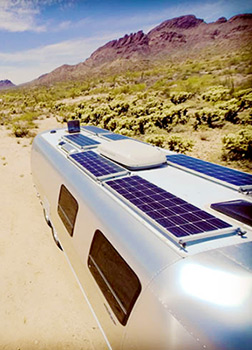
Many things can go wrong when camping. So coming back to the campsite after a long day of working or playing to find your batteries are dead can cause all sorts of trouble. No matter how many backup batteries you have, eventually, they will need to be charged. The two best ways to charge your batteries are through a solar-powered battery or a generator. Even better, an inverter generator to provide you with enough power for all your equipment and sensitive electronics.
Solar energy is more popular than ever. They come in a variety of sizes and styles, and their prices have gone down significantly in the past few years. Whether you go all-in on a big solar kit mounted on the roof of your RV or with just a small portable kit to power conversion van appliances, solar power will allow you the freedom of fume-free green energy.
Even with a solar set up, a portable generator is a must-have. To live off the grid for an extended period, you’ll need an emergency backup in case solar panels fail. Additionally, parking in the shade, cloudy days, or staying in rainy environments will leave you unable to use solar power.
Until the sun shines again for several hours, you’ll be stuck with nothing. So even those dedicated to minimalism should have a good RV generator.
Make sure to measure the power of the equipment and appliances you will be using before deciding on the size and type of generator to buy. Keep in mind that conserving energy when camping off the grid is essential. So purchasing a quiet portable generator with a little more power than necessary is vital to fuel your devices.
2. Efficient Lighting – LED Lights
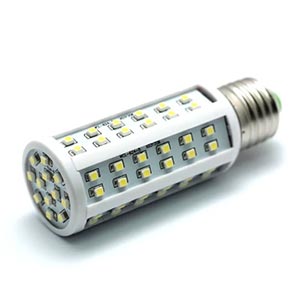
One of the easiest ways to save energy is by replacing all the lights in your motorhome, conversion van, or RV with LED lights. LEDs are 90% more efficient compared to the traditional halogen bulbs. This means you will be keeping all those old, standard bulbs out of landfills. Additionally, they don’t produce heat, which can be a fire hazard. Having all LED lighting is an excellent safety feature when help may be hours away in the case of a fire.
They also live much longer than their traditional counterparts. While the initial purchase price of LED lights is a bit higher. But, they are more efficient, which will make a massive difference in your power savings in the long run. As an added benefit, LEDs can be purchased in various colors and sizes to fit in any mobile setup and suit every mood.
3. Stay Cool – Low Energy Fans
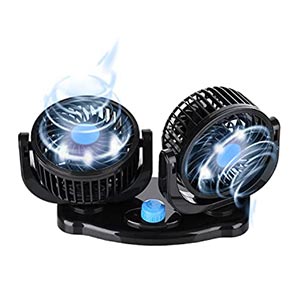
In the hot summers, using an air conditioner constantly while boondocking is usually not possible. Air conditioning units use a great deal of power. Running them 24/7 while off the grid is not energy efficient. While you can run AC units off of your generator, low energy fans are a much better way to keep cool on a hot summer day. Mounting them to the roof vents of your mobile home is an excellent way to increase ventilation and airflow circulation.
Some RV owners choose to use temperature-sensitive vent fans, which automatically kick when the temperature gets too high. Like a home thermostat, you can set the fan’s desired temperature. It will vary the fan speed based on the inside temperature.
Using reflective bubble wrap, tin foil, blackout curtains, or even dark-colored towels over the windows will also provide some protection from the direct sunlight. Keeping the interior of your vehicle dark will help to keep temperatures manageable.
4. Get Warm – Electric Heater
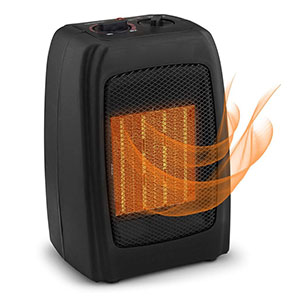
In some areas, temperatures can get very chilly. This is especially true if you are camping in an area of very high or very low elevation. Most RV furnaces run on propane and are not very fuel-efficient. Even though a large RV’s central heating systems will keep you plenty warm. Propane in these systems run out quickly and are not equipped for long, extended trips. If you’re winter RVing in a full hookup campground with propane on sight, this presents only a small hassle and a little extra time.
However, if you want to camp off-grid for extended periods, you’ll need a source of heat that doesn’t rely on non-renewable resources. Many campers delight in the warmth of a campfire, but these aren’t always an option. Inclement weather will put a damper on campfires. So having an electric heater, at least as an emergency option, is key to keeping warm.
Additionally, propane heaters can be a hazard. Gas leaks can become a real threat to health and safety. Gas leaks, at best, will make you feel ill. At worst, it can poison anyone in the vehicle and even cause explosions and fire. Sleeping in a frequent moving vehicle, jostled, and runs over potholes with a propane heater running all night can be a significant hazard. While most times, gas leaks are detected early, you never know when they can happen. So sleeping in the warm glow of an electric heater reduces the risks associated with propane use.
Don’t forget to properly vent your vehicle when using any heating source and never leave it unattended. Additionally, make sure always to read the user’s manual carefully and check the amperage of electric heaters to ensure your power source can run it safely and effectively.
5. Water Saving – Shower Head and Faucet Aerator
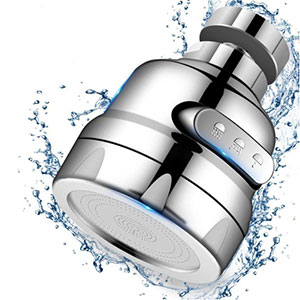
We’ve talked about ways to conserve power, but now let’s talk about saving water in your RV. The easiest way to do this is to turn the water off when you’re not using it. Of course, this sounds obvious, but it will show a surprising difference in water consumption when practiced in everyday activities. For example, most of us who live in brick and mortar (or sticks and bricks) houses leave the water on while we’re washing our hands, brushing our teeth, or washing dishes. Once you’ve lived in a recreational vehicle for a while, you’ll find that this is incredibly wasteful. When you carry your entire water supply around with you, you’ll use any method to limit the need to refill fresh water tanks and conserve.
While turning the water off in between uses helps water conservation, using a water-saving faucet aerator is even more efficient. Water aerators limit the amount of water coming out of your faucets by mixing it with a burst of air. This gives better water distribution over surfaces and further reduces water consumption by up to 50% over a traditional showerhead or faucet.
Ultimately, you get better water pressure while saving your precious freshwater tank contents while also being environmentally friendly. Furthermore, it will also allow you to use less energy from your water heater, as less water needs to be cycled before use.
6. Keep Clean – Handheld Vacuum
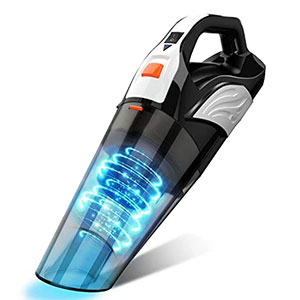
More boondocking essentials include a way to keep everything clean in your RV or camper. No matter how tidy you are, RV floors get dirty very quickly from accumulated dust, mud, sand. Not to mention, any pet’s hair. Newer RVs often have central vacuums, but they are usually far from efficient. A powerful handheld vacuum cleaner is good to have in your RV, to keep everything clean and tidy. They are generally pretty small too, and they won’t take much space in your RV.
Choose a compact vacuum cleaner that gets the job done without taking up too much space. You’ll also want to find mops with small footprints, step stools, and similar items that you can fold away when not in use. The storage areas in most campers barely have enough room to store the necessary things, let alone an entire supply of accessories and cleaners. So one of the main boondocking essentials is to always try to keep it simple. Find products that serve more than one purpose. Find tools that help you get the job done and comes in a compact size.
7. Safety Gadgets – Leveling Tools, Safes, and Locks
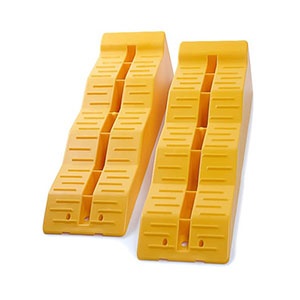
Rarely will you find a perfect level camping spot for your RV. Keeping leveling blocks and jacks can help even things out for your appliances to run properly. Make sure to choose high-quality materials for your blocks and jacks to help support your RV wheels. You may also need a bubble level tool so that you can easily check the ground level.
You will always be traveling with valuables, and although it’s wise to bring this down to a minimum. Many anti-theft products for RVs exist today, such as alarms, hidden safes, deadbolt locks, kingpin locks, motion detector lights.
To reduce the risk of losing valuable belongings during a break-in, you can consider making a secret compartment for your safe, assemble it in a way so it would appear like a fixed wall. You can get laptop-sized digital safes as well, to keep your valuables safe. After all, securing your RV is really important and will give you some peace of mind.
8. Fix It – Repair Kits, Tools, and First Aid
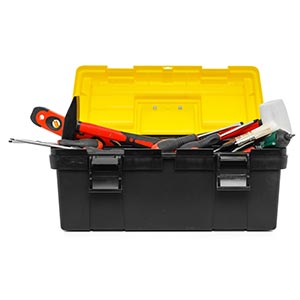
Being able to fix things when they go wrong is a must-have when camping. A toolbox is a must-have for any recreational vehicle. An RV toolbox should include at least a multi-tool knife, screwdrivers, hammer, scissors, ropes, lighter, strong duct tape, and a flashlight. Also, consider bringing a repair kit for any other equipment that you carry along.
Having a first aid kit is also a dry camping essential. Burns, scratches, cuts, or bumps are bound to happen on any camping trip. But when you’re off the grid, small hurts can become big problems. You can purchase a ready-made kit or make your own.
Don’t forget to include in the boondocking essentials kit any personal medications, sun and insect protection, and necessary medical supplies like bandages, gauze, an antiseptic, and aspirin.
The Final Word
Boondocking has become wildly popular in recent years, and for a good reason. It’s so much fun to live in a remote location with just what you carry in your vehicle. Off-grid camping forces you to leave behind many modern luxuries and hones survivalist skills. If you make the choice to dry camp, be sure to take along the essentials for RV camping mentioned in this article to make your trip both enjoyable and energy-efficient. Solar power and a generator, LED lights, low energy fans, electric heaters, faucet aerators, tools, and a first aid kit, are some of the main boondocking essentials.

